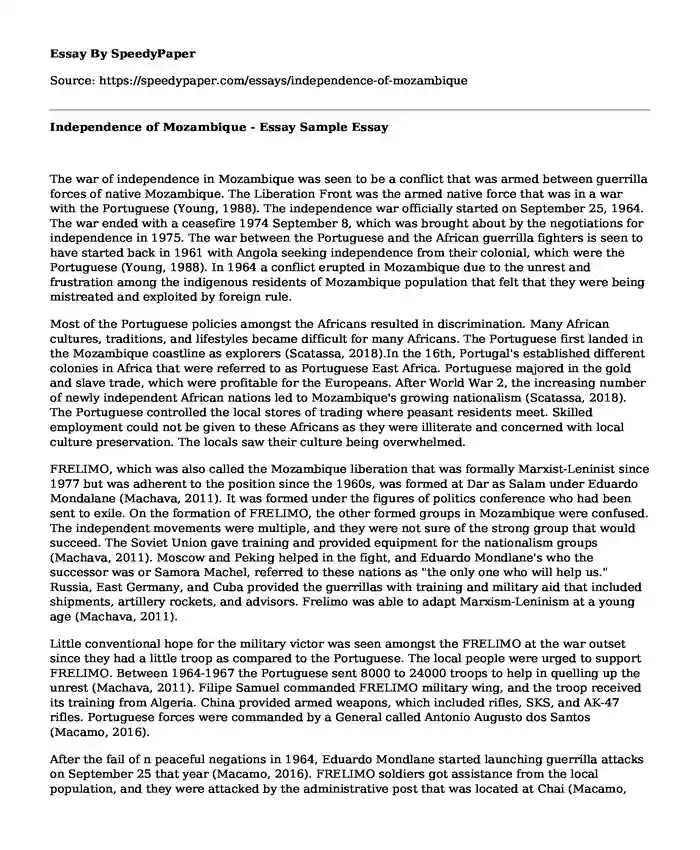The war of independence in Mozambique was seen to be a conflict that was armed between guerrilla forces of native Mozambique. The Liberation Front was the armed native force that was in a war with the Portuguese (Young, 1988). The independence war officially started on September 25, 1964. The war ended with a ceasefire 1974 September 8, which was brought about by the negotiations for independence in 1975. The war between the Portuguese and the African guerrilla fighters is seen to have started back in 1961 with Angola seeking independence from their colonial, which were the Portuguese (Young, 1988). In 1964 a conflict erupted in Mozambique due to the unrest and frustration among the indigenous residents of Mozambique population that felt that they were being mistreated and exploited by foreign rule.
Most of the Portuguese policies amongst the Africans resulted in discrimination. Many African cultures, traditions, and lifestyles became difficult for many Africans. The Portuguese first landed in the Mozambique coastline as explorers (Scatassa, 2018).In the 16th, Portugal's established different colonies in Africa that were referred to as Portuguese East Africa. Portuguese majored in the gold and slave trade, which were profitable for the Europeans. After World War 2, the increasing number of newly independent African nations led to Mozambique's growing nationalism (Scatassa, 2018). The Portuguese controlled the local stores of trading where peasant residents meet. Skilled employment could not be given to these Africans as they were illiterate and concerned with local culture preservation. The locals saw their culture being overwhelmed.
FRELIMO, which was also called the Mozambique liberation that was formally Marxist-Leninist since 1977 but was adherent to the position since the 1960s, was formed at Dar as Salam under Eduardo Mondalane (Machava, 2011). It was formed under the figures of politics conference who had been sent to exile. On the formation of FRELIMO, the other formed groups in Mozambique were confused. The independent movements were multiple, and they were not sure of the strong group that would succeed. The Soviet Union gave training and provided equipment for the nationalism groups (Machava, 2011). Moscow and Peking helped in the fight, and Eduardo Mondlane's who the successor was or Samora Machel, referred to these nations as "the only one who will help us." Russia, East Germany, and Cuba provided the guerrillas with training and military aid that included shipments, artillery rockets, and advisors. Frelimo was able to adapt Marxism-Leninism at a young age (Machava, 2011).
Little conventional hope for the military victor was seen amongst the FRELIMO at the war outset since they had a little troop as compared to the Portuguese. The local people were urged to support FRELIMO. Between 1964-1967 the Portuguese sent 8000 to 24000 troops to help in quelling up the unrest (Machava, 2011). Filipe Samuel commanded FRELIMO military wing, and the troop received its training from Algeria. China provided armed weapons, which included rifles, SKS, and AK-47 rifles. Portuguese forces were commanded by a General called Antonio Augusto dos Santos (Macamo, 2016).
After the fail of n peaceful negations in 1964, Eduardo Mondlane started launching guerrilla attacks on September 25 that year (Macamo, 2016). FRELIMO soldiers got assistance from the local population, and they were attacked by the administrative post that was located at Chai (Macamo, 2016). Guerrilla attacks helped FRELIMO to evade the pursuit. On heavy rains seasons, it was difficult for vehicle airplanes and Portuguese to move. This favored FRELIMO as they were locals with little arms hence moved through bushes freely. In November, Portuguese troops suffered losses as they had a low number and irregular troops.
Eduardo Mundane was killed on February 3, 1969, by a smuggled explosive in his locality (Macamo, 2016). Secrete Portuguese police are said to have assassinated Mondlane after he sent him a parcel to his office at Dar as Salaam. In 1967 General Augusto was succeeded by Kaulza de Arriaga. During his error, FRELIMO intensified operations in guerrilla. Forty-four percent of the Portuguese budget was spent on fighting the colonial wars hence defoliating infrastructure developments (Macamo, 2016). On April 25 1974, a culminated dissatisfaction in Portugal when a revolution carnation, which is a peaceful leftist coup d'état in Lisbon. This lead to Portuguese citizens leaves Mozambique. Due to the change of Lisbon leadership, soldiers refused to fight and stayed in barracks with no work.
On September 7 1974, Lusaka Accord was signed, which resulted from the negotiations between the Portuguese administrations. This provided a complete hand-over of the power to the FRELIMO through uncontested elections. On June 25, 1975, formal independence was set, which was the 13th anniversary since FRELIMO's founding.
References
Macamo, E. (2016). Violence and political culture in Mozambique. Social Dynamics, 42(1), 85-105. https://en.wikipedia.org/wiki/Mozambican_War_of_Independence
Machava, B. L. (2011). State discourse on internal security and the politics of punishment in post-independence Mozambique (1975–1983). Journal of Southern African Studies, 37(3), 593-609. https://en.wikipedia.org/wiki/History_of_Mozambique
Scatassa, M. (2018). Cold War migration: Mozambican workers, students, and troopers in East Germany. From the independence of Mozambique to the collapse of the GDR. https://en.wikipedia.org/wiki/Independence_movements_in_Mozambique
Victoria Luis Munguambe, C. (2017). Nationalism and exile in an age of solidarity: Frelimo–ZANU relations in Mozambique (1975–1980). Journal of Southern African Studies, 43(1), 161-178. https://thecommonwealth.org/our-member-countries/mozambique/history
Young, T. (1988). The politics of development in Angola and Mozambique. African Affairs, 87(347), 165-184. https://artsandculture.google.com/exhibit/the-struggle-for-freedom-in-mozambique-jstor/QRl-vPcs?hl=en
Cite this page
Independence of Mozambique - Essay Sample. (2023, Dec 13). Retrieved from https://speedypaper.net/essays/independence-of-mozambique
Request Removal
If you are the original author of this essay and no longer wish to have it published on the SpeedyPaper website, please click below to request its removal:
- Free Essay: Impact of Globalization on Mexico's Trade Relations with the USA
- Tourism Essay Example: Top Destinations in California
- Essay in American History: The Battle of Antietam
- Free Essay on Tourism and Climate Change
- The Crisis Deepens: World War II, Free Essay Sample
- Free Essay: Madison & Hamilton Analysis of the Federalists Papers
- Free Essay: The Role of Nurses in Providing Dietary Education for Type 2 Diabetic
Popular categories





